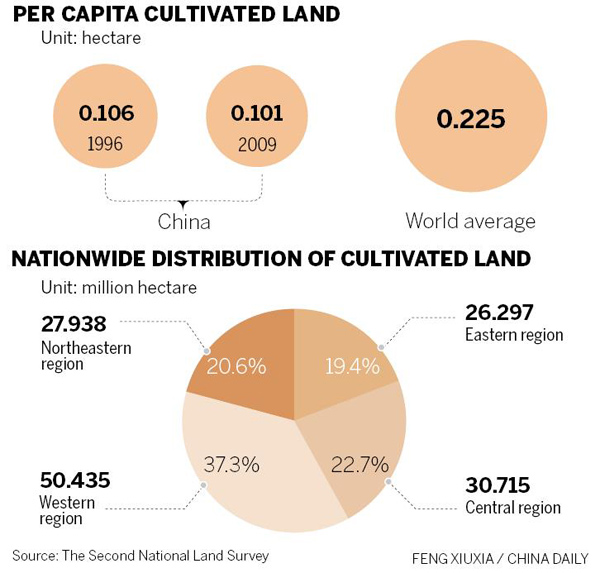 Fri, Apr 18, 2025
Fri, Apr 18, 2025

 |
Farming of contaminated arable land almost the size of Belgium has been halted and the land will be rehabilitated to ensure food security, a senior official said on Monday.
A soil survey by the Ministry of Environmental Protection found that pollution affects about 3.33 million hectares, Wang Shiyuan, vice-minister of land and resources, said.
"This finding is similar to the geographical environmental survey by the Ministry of Land and Resources," Wang added.
Arable land in China totaled 135.4 million hectares at the end of last year, 15 million hectares more than the bottom line set by the government to ensure food security, Wang said at a news conference, citing the results of the second national land survey released on Monday.
However, the amount of stable cultivated land will drop to 120 million hectares, as some farmland will be converted to forests, grasslands and wetlands, while pollution will leave some land unusable, Wang said.
The environment ministry earlier declined to disclose data related to soil pollution, saying further investigation is needed and that the figure is a State secret.
A nationwide survey on soil pollution was carried out between 2006 and 2010, led by the Ministry of Environmental Protection and the Ministry of Land and Resources, but the results were never made public.
Bai Chengshou, deputy head of the nature and ecology conservation department at the environmental protection ministry, said results will be published in future, with more data included.
"The current work is to take more samples in key areas with severe soil pollution, so that the results can be more accurate and representative," he said.
Bai said a "soil pollution action plan", similar to the Airborne Pollution Action Plan (2013-17) released by the central government in mid-September, is being prepared.
He said the plan, which will provide a detailed framework for national soil pollution control measures before 2017, is likely to be released around June after being approved by the State Council.
Wang said the swaths of polluted farmland are concentrated in developed eastern and central regions and in the northeastern industrial belt.
He singled out Hunan province which, with its booming heavy industries, had repeatedly reported much higher levels of cadmium found in rice than permitted by national standards.
Answering a China Daily question on whether the tainted land is still being farmed, Wang said no further planting will be allowed on it, as food safety is a top concern for governments at various levels.
Each year, the central government will earmark several billion yuan to rehabilitate farmland tainted by heavy metals and threatened by the over-draining of underground water, Wang said, without giving details.
"Only rehabilitated farmland that has passed assessment will be used again," he said.
Wu Xiaoqing, vice-minister of environmental protection, said in early December that the number of enterprises engaged in soil restoration accounted for only 3.7 percent of the 8,000 enterprises in the environmental service industry, far below the ratio of companies dealing with water and air pollution control.
Wang Qi, an expert on solid-waste treatment, said, "This is probably because soil pollution requires higher costs, sometimes hundreds of times more than the cost of solving air and water pollution."
Wang said he does not think there are any efficient and quick solutions to soil pollution, as the popular method of using plants to trap heavy metals in the soil usually takes more than a decade to work.
"One of the most practicable plans may be to replace crops with other plants such as trees," said Wang, head of the Institute of Environmental Engineering Technology at the Chinese Research Academy of Environmental Sciences.
Ren Tianzhi, director of the Agro-Environmental Protection Institute under the Ministry of Agriculture, said that in addition to heavy metals from industry, excessive use of pesticides and feed additives also contaminates farmland.
"Scientists are working to select plant varieties resistant to heavy metal pollution, to ensure food safety," he said.
Lawmakers have already deliberated on revisions to the Environmental Protection Law, to address and remedy the soil pollution problem. The law was enacted in 1989.
In October, they proposed an amendment, requiring the State to set up a system covering soil investigation, pollution monitoring, evaluation and rehabilitation.
In addition, the country will legislate the prevention of soil pollution by the end of 2017, according to a plan released in October by the Standing Committee of the National People’s Congress, the top legislature.
A central rural work conference, presided over by President Xi Jinping last week, vowed to improve food safety and improve the environment where agricultural products are grown.
If farmland or water is seriously polluted, such areas should be taken out of use, a statement issued after the conference said.
Contact the writers at zhaohuanxin@chinadaily.com.cn and wuwencong@chinadaily.com.cn
Jin Zhu contributed to this story.